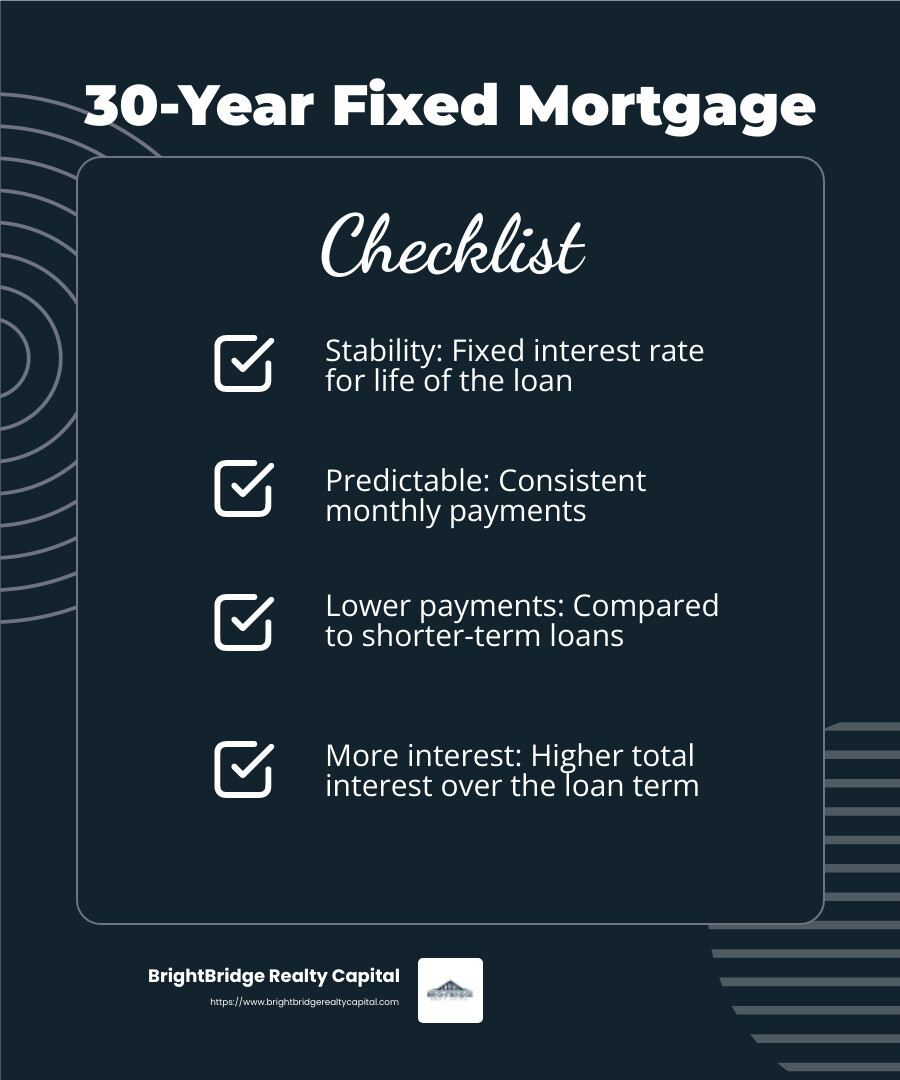Rate Your Options: Today's Real Estate Loan Rates Compared

Real estate loan rates are crucial for investors looking to maximize returns on their property ventures. Whether you're diving into a fix-and-flip project or expanding your rental portfolio, understanding these rates can significantly impact your bottom line. Here's a quick look at this essential subject:
- Current Rates: Nationwide, the average 30-year fixed mortgage APR is around 6.75%, while 15-year fixed mortgages hover at 6.03%.
- Loan Terms: Factors like loan duration and type (fixed vs. adjustable) can affect the rate you receive.
- APRs Matter: More than just the interest rate, APRs include fees and closing costs, offering a clearer picture of total loan expense.
To make informed decisions, it’s vital to grasp how mortgage rates work alongside loan terms and APRs. This understanding will help you choose the best loan options for your real estate investments, ensuring you steer the fluctuating loan landscape effectively.

Understanding Real Estate Loan Rates
When it comes to real estate loan rates, understanding the basics of interest rates, loan types, and APR is key to making smart financial decisions.
Interest Rates are the percentage of the loan amount that you'll pay to the lender as a cost for borrowing. They can be fixed, meaning they stay the same throughout the loan term, or adjustable, meaning they can change over time. For example, a 30-year fixed mortgage rate is currently around 6.70%, while a 15-year fixed rate is about 5.96%.
Loan Types matter because they dictate how interest is applied and give you different options to suit your needs. Common types include:
- Fixed-rate mortgages: These have a consistent interest rate and monthly payment. They are ideal if you plan to stay in your home for a long time.
- Adjustable-rate mortgages (ARMs): These start with a lower interest rate that can change after an initial period. They may be beneficial if you expect to move or refinance before the rate adjusts.
APR (Annual Percentage Rate) is a broader measure of the cost of borrowing money. It includes the interest rate plus other fees, like origination fees and closing costs. This makes it a more comprehensive way to compare different loan options. For example, a loan with a 6.75% interest rate might have an APR of 6.79% due to additional fees.
Why APRs Matter:
APRs give you a clearer picture of the total cost of a loan over time. For instance, a loan with a lower interest rate but high fees could end up costing more than a loan with a slightly higher rate but lower fees. Always look at the APR to understand the full financial commitment.
By understanding these elements, you can more effectively compare loan options and choose one that aligns with your financial goals. This knowledge can empower you to make decisions that improve your real estate investment strategy.
Current Trends in Real Estate Loan Rates
Mortgage rate trends are influenced by a variety of factors, including economic conditions and government policies. As of April 2025, the national average for a 30-year fixed mortgage is about 6.70%. This is slightly lower than it was a week ago, indicating a small but shift in the market.
30-year fixed mortgages remain the most popular choice for homebuyers. Their appeal lies in the stability they offer: a consistent interest rate and predictable monthly payments. This makes them ideal for long-term planning. Currently, the 30-year fixed refinance APR is 6.87%, slightly higher than the purchase rate, reflecting the additional costs associated with refinancing.
Adjustable-rate mortgages (ARMs) offer a different kind of flexibility. They start with a lower interest rate than fixed-rate mortgages, which can be appealing if you're planning to sell or refinance before the rate adjusts. However, they come with the risk of rate increases over time. Recent trends show that ARMs are influenced by the 10-year Treasury yield, which has seen fluctuations due to economic uncertainties, such as tariff policies.
It's essential to keep an eye on these trends. While experts predicted rates might dip below 6% in 2024, the current rates remain lifted. This highlights the importance of staying informed and comparing different loan options to find the best fit for your financial situation.
In the next section, we'll dive into how to compare real estate loan rates, helping you steer lender evaluations and rate quotes.
How to Compare Real Estate Loan Rates
Comparing real estate loan rates can seem daunting, but with the right approach, you can find a deal that suits your needs. Here's a simple guide to help you steer this process:
Loan Comparison
First, determine what type of loan fits your situation. Are you looking for a 30-year fixed mortgage, or does an adjustable-rate mortgage (ARM) better suit your plans? Each has its pros and cons. A 30-year fixed mortgage offers stability, while ARMs might offer lower initial rates but come with the risk of rate increases.
Use a mortgage calculator to estimate your monthly payments for different loan types. This will give you a clearer picture of what you can afford.
Lender Evaluation
Not all lenders are created equal. Some may offer lower rates, but with higher fees. It's important to look beyond the interest rate and consider the annual percentage rate (APR), which includes additional costs like origination fees, discount points, and closing costs.
Read reviews and testimonials from other borrowers. This can give you insight into the lender's customer service and reliability.
Rate Quotes
Request rate quotes from multiple lenders. This step is crucial. It allows you to see what different lenders are willing to offer based on your credit profile and financial situation. Rates can vary significantly between lenders.
When requesting quotes, make sure to do it within a short time frame—typically within 14 to 45 days. This way, all the inquiries will count as one on your credit report, minimizing any potential impact on your credit score.
Key Takeaway
The key to finding the best real estate loan rates is to be informed and proactive. Compare different loan types, evaluate lenders thoroughly, and gather multiple rate quotes. This approach increases your chances of securing a favorable rate, potentially saving you thousands over the life of your loan.
Next, we'll explore real estate loan rates by type, breaking down the specifics of 30-year fixed, 15-year fixed, and adjustable-rate mortgages.
Real Estate Loan Rates by Type
When it comes to real estate loan rates, understanding the different types of mortgages can help you make informed decisions. Here's a breakdown of the most common options: 30-year fixed, 15-year fixed, and adjustable-rate mortgages (ARMs).
30-Year Fixed Mortgage
The 30-year fixed-rate mortgage is the most popular choice for homebuyers. It offers stability and predictability, with a fixed interest rate and consistent monthly payments over the life of the loan. This makes budgeting easier, as you won't have to worry about fluctuating payments.
Pros: Lower monthly payments compared to shorter-term loans. This can make homeownership more affordable, especially for first-time buyers. It also allows for more financial flexibility, letting you allocate funds to other priorities like savings or investments.
Cons: You'll pay more in interest over the life of the loan than with a shorter-term mortgage. Additionally, the interest rates for 30-year loans are typically higher than those for shorter terms.

15-Year Fixed Mortgage
A 15-year fixed-rate mortgage is another option that offers a stable interest rate and monthly payments. However, the loan term is shorter, which means you'll pay off your home faster.
Pros: You'll pay significantly less in total interest compared to a 30-year loan. This option is great if you want to build equity faster and own your home sooner.
Cons: The monthly payments are higher, which can strain your budget. It's important to ensure that you can comfortably afford these payments before committing.
Adjustable-Rate Mortgage (ARM)
An adjustable-rate mortgage (ARM) typically starts with a lower interest rate than fixed-rate loans. However, the rate can change after an initial fixed period, usually 5, 7, or 10 years, based on market conditions.
Pros: The initial lower rates can make ARMs attractive, especially if you plan to sell or refinance before the adjustable period begins. This can result in significant savings initially.
Cons: Once the fixed period ends, your interest rate—and therefore your monthly payment—can increase, sometimes significantly. This introduces uncertainty and potential financial strain if rates rise substantially.
Understanding these real estate loan rates by type will help you choose the best mortgage for your financial situation and long-term goals. Next, we'll tackle some frequently asked questions about real estate loan rates to further guide your decision-making process.
Frequently Asked Questions about Real Estate Loan Rates
What factors influence real estate loan rates?
Several key factors can influence real estate loan rates:
Interest Rates: Set by the broader economic environment, interest rates are influenced by the Federal Reserve's policies, inflation, and market demand. When these rates are low, borrowing becomes cheaper.
Credit Score: Your credit score plays a crucial role. A higher score often means a lower interest rate because lenders see you as a lower risk.
Loan Term: The length of your loan can affect the rate. Generally, shorter terms come with lower interest rates but higher monthly payments.
Down Payment: If you put down less than 20%, you might face a higher rate. Bigger down payments can lead to better rates.
How can I secure the best real estate loan rate?
Securing the best rate involves a few strategic steps:
Rate Quotes: Start by obtaining rate quotes from multiple lenders. This allows you to compare and choose the best option.
Lender Comparison: Different lenders offer different rates and terms. Compare them to find the most favorable conditions for your situation.
Preapproval: Getting preapproved shows sellers and lenders that you're serious. It also locks in a rate for a set period, protecting you from rate increases while you shop.
Improving Your Credit: Before applying, work on boosting your credit score. Pay off debts, fix any errors on your credit report, and avoid taking on new debt.
Are adjustable-rate mortgages a good option?
Adjustable-rate mortgages (ARMs) can be a double-edged sword:
Pros: They often start with lower rates compared to fixed-rate mortgages. This can save you money initially, especially if you plan to move or refinance before the adjustable period.
Cons: The interest rate can change after the initial fixed period. If rates rise, your monthly payments could increase significantly. Most ARMs have rate caps, which limit how much the rate can increase, but it's important to understand these limits before committing.
Choosing an ARM depends on your financial situation and future plans. If you anticipate changes in your circumstances, like moving or increased income, an ARM might be beneficial. Otherwise, the unpredictability could be risky.
Now that we've covered these common questions, let's move on to exploring how BrightBridge Realty Capital can offer customized financing solutions to meet your needs.
Conclusion
At BrightBridge Realty Capital, we recognize that every real estate investor has unique needs and goals. That's why we offer customized financing solutions that are designed to fit your specific situation. Whether you're looking to flip properties, build from the ground up, or expand your rental portfolio, we're here to help you make informed decisions with competitive rates and flexible terms.
Our team understands the importance of acting quickly in real estate. That's why we pride ourselves on fast closings, often within a week. By cutting out the middleman, we provide direct lending that simplifies the process and keeps things moving smoothly. This means you can seize opportunities as they arise without unnecessary delays.
Our approach is all about making your investment strategy work for you. With our nationwide reach, you have access to capital no matter where your properties are located. Plus, our expert team is committed to guiding you through every step of the process, from application to final payoff.
Ready to explore how we can support your real estate ventures? Find more about our services and see how BrightBridge Realty Capital can bridge the gap in your investment journey.


